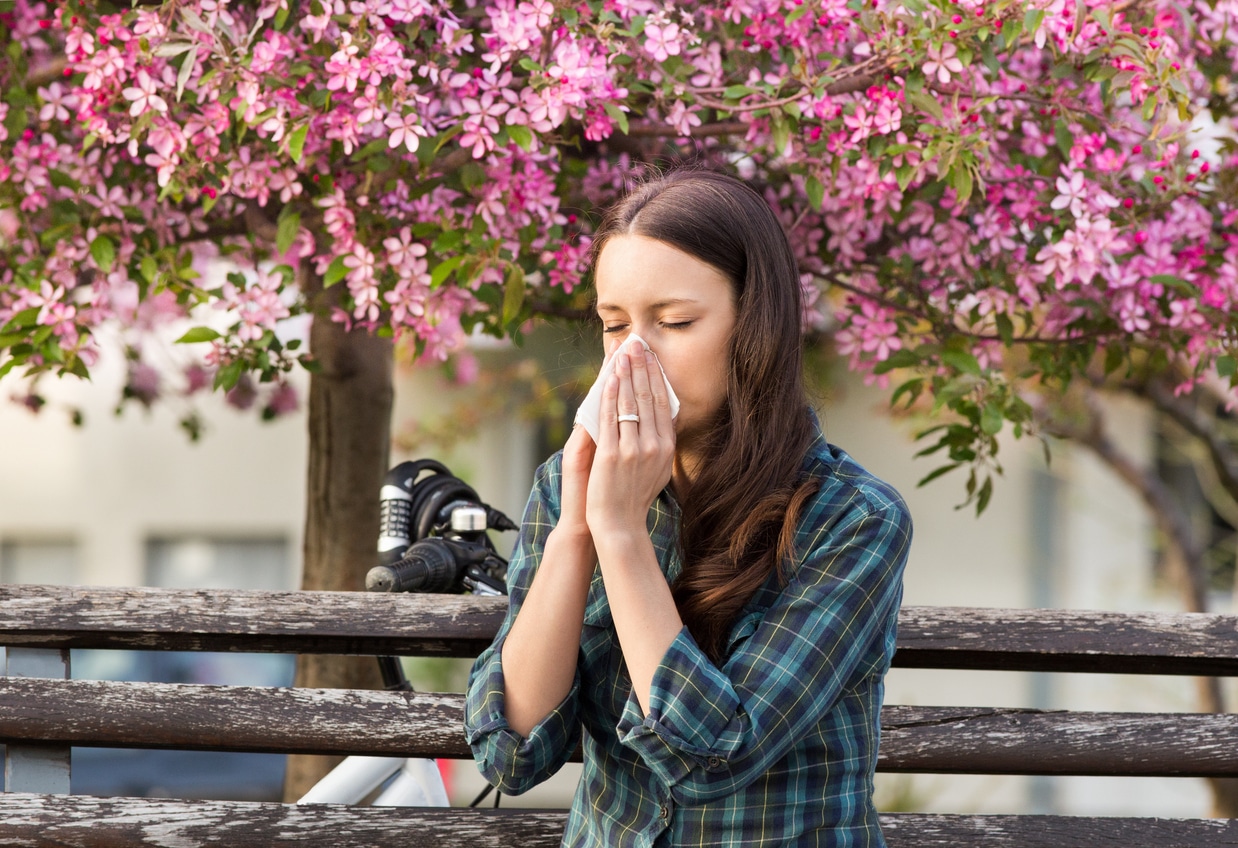3 Tips to Alleviate Spring Allergy Symptoms

The blooming flowers and growing grass can trigger a range of unpleasant symptoms, from sneezing fits and watery eyes, to congestion and headaches. If you’re affected by spring allergy symptoms, we’ll explore the causes of spring allergies and provide you with practical tips to alleviate your symptoms and enjoy the season to the fullest.
But First: What Are Spring Allergies?
Spring allergies, also known as hay fever or seasonal allergies, are triggered by an overreaction of the immune system to certain allergens present in the environment during the spring season. The most common allergens during this time include pollen from trees, grasses, and weeds. When these allergens enter the body through inhalation or contact with the skin or eyes, the immune system perceives them as harmful invaders and releases a chemical called histamine. Histamine is responsible for the classic spring allergy symptoms, such as sneezing, itching, nasal congestion, and watery eyes.
Recognizing Spring Allergy Symptoms
Spring allergy symptoms can vary from person to person, but some common signs to watch out for include:
- Sneezing: Frequent and repetitive sneezing is a typical symptom of spring allergies.
- Runny or Stuffy Nose: Your nose may become runny or congested due to the inflammation caused by the allergens.
- Itchy or Watery Eyes: Allergens can cause your eyes to itch, become red, and produce excessive tears.
- Nasal Congestion: The inflammation in your nasal passages can lead to a feeling of stuffiness or blockage.
- Scratchy Throat: Postnasal drip can cause throat irritation and a scratchy feeling.
- Fatigue: Constantly battling allergy symptoms can leave you feeling tired and drained.
- Headache: Some individuals may experience headaches or sinus pressure due to their allergies.
If you’re experiencing any of these symptoms or a minor allergy reaction, you can visit the closest AllCare clinic and receive medical guidance on a walk-in visit.
Effective Ways to Alleviate Spring Allergy Symptoms
1. Minimize Exposure to Allergens
The first step in managing spring allergies is to minimize your exposure to the allergens causing your symptoms. Here are 3 practical tips to help you achieve this:
- Keep Windows Closed: To prevent pollen from entering your home, keep your windows closed, especially on days when pollen levels are high. Use air conditioning to keep your home cool and comfortable.
- Remove Pollen from Your Body and Clothes: After spending time outdoors, take a shower and wash your hair to remove any pollen particles that may have settled on your body. It’s also a good idea to change your clothes and wash them promptly to prevent pollen from spreading inside your home.
- Keep Your Home Clean: Regularly clean your home to minimize allergens. Vacuum carpets and rugs frequently, using a vacuum cleaner equipped with a HEPA filter.
2. Natural Remedies for Spring Allergies
In addition to OTC medications, several natural remedies can help alleviate spring allergy symptoms. While these remedies may not work for everyone, they are worth exploring:
- Saline Nasal Rinse: A saline nasal rinse, also known as nasal irrigation, can help clear nasal passages of allergens and mucus, providing relief from congestion and postnasal drip.
- Local Honey: Some people find relief from seasonal allergies by consuming local honey produced by bees in their area.
- Vitamin C: This is known for its immune-boosting properties and may help alleviate allergy symptoms.
3. Medication Treatments
If other methods are not effective, there are over-the-counter medications that your primary care doctor can recommend for you, if appropriate. Some examples include:
- Anti-histamines: These are usually medications in pill form that you can take that lower your body’s response to chemicals called histamines that cause allergic symptoms.
- Steroid nasal spray: To reduce the inflammation that can lead to congestion and post-nasal drip, these are medications that you would spray into your nose.
- Topical steroid cream: As some allergies present with itching or a rash, steroids can also be applied as cream to alleviate symptoms involving the skin after exposure to allergens in the environment.
- Oral steroid: This is a stronger medication, also in pill form, that could treat refractory allergy symptoms.
Schedule Your Appointment with a Healthcare Provider
If you’re struggling to find relief from your spring allergy symptoms or if your symptoms are interfering with your daily life, consult with a healthcare provider. At AllCare, we can help diagnose your allergies, recommend appropriate treatments, and provide personalized advice based on your specific needs. If you require further evaluation or treatment, we will be able to refer you to a specialist.
Spring Allergy Treatment at AllCare
By minimizing your exposure to allergens, exploring natural remedies and seeking professional guidance, you can find relief and improve your quality of life during spring. Get ahead of spring allergy season and prioritize your health by getting your spring allergy symptoms treated today at AllCare. Our experienced healthcare professionals are ready to provide you with the latest and most effective care to overcome spring allergies. Schedule an appointment at AllCare now!